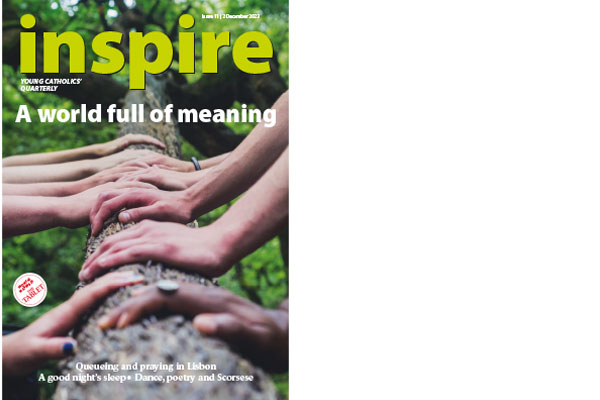‘What is the meaning of my life? What is the meaning of my time on this Earth? And what is the ultimate meaning of all my work and effort?’
Not the exclamation of some angst-ridden student but the words of an 87-year-old Jesuit you might expect to have his answers to these questions sorted out. I imagine that Pope Francis does – but these words in Laudate Deum, channelling the voice of the individual dispossessed and disillusioned by the ethical cavity of consumerist “meritocracy”, recognise that angst at large in the world.
Laudate Deum, Francis’ apostolic exhortation in anticipation of the current COP28 climate conference, is not an obviously “youthful” document. In fact, “youth” doesn’t crop up at all. It is really a well-argued harangue, a challenge to world leaders and international bodies who have failed to address the climate crisis in the eight years since Laudato Si’ (which included the simple, essential assertion: “Young people demand change.”) At its heart is an old-fashioned call for humility, “for when human beings claim to take God’s place, they become their own worst enemies”.
By not attempting to address young people, Francis has found a certain resonance with them, true to the “intergenerational solidarity” that he has long advocated. He too is frustrated and impatient, trying for the umpteenth time to make individuals understand a message that shouldn’t need explaining. There are echoes of the anxieties – fears, even – of people interested in living past 2060, and the sense – embedded in those questions about “meaning” – that there might be something deeper at fault. I have friends whose lives have been interrupted by time spent just worrying about the environment. If we don’t complement concern with hope, we can’t do anything at all.
Posed the wrong way, the Catholic response to the climate crisis can seem at once petulant and grandiose, mixing self-righteous anger with highfalutin claims that most environment activists think a ridiculous irrelevance to the key question of survival. We’re probably not helped by Newman’s remark about it being spiritually speaking better for the Earth to faila and millions to perish than for one soul to commit the least sin. It’s up to us to make the case (which Newman made too) that this stuff doesn’t exist in isolation: our biological and moral survival are not separate silos and the climate crisis is not a zero-sum game. In 2019, UN diplomats awkwardly applauded Greta Thunberg when she accused them of stealing her future but simply apportioning blame and demanding action from the same ineffective systems leave us at an impasse. If older generations fail to change, we will have to.
In the summer a new book, Generation Laudato Si’, launched what it calls a “global ecological conversation” with the voices of 40 people under 35 from across the world, addressing questions of leadership, education and economics in the context of the climate crisis. These individuals impress not only for having overcome the obstacles to youth participation in these fields but also in their liberated approach to them.
Br Benard Omukuyia CSC of the Laudato Youth Initiative in Uganda describes the “beautiful intersection of faith and activism” where our generation can recognise that change is not only be something to demand of COP delegates but a phenomenon we find emerging from ourselves, in unexpected forms. It can seem almost mundane. Individual deeds far from the centres of power are freighted with meaning.
Laudato Si’ called for action on climate change by invoking an enriched vision of our relationship with the Earth, but the past eight years have revealed that too few of us share that vision. Indifference and alarmism can both sever the vital link between our lives and our environment. We need to be persuaded that what little we can do has a point. Laudate Deum shows that, no less than the 1.5°C target or defences against rising sea levels, rediscovering our sense of meaning is a matter of urgency.
Nor is this a peculiarly Catholic need. Speaking in London in November, the author Katherine Rundell – who has little else in common with the Pope – picked up on some strikingly resonant themes. Her writing about animals, she said, was intended to revive our sense of “wonder” in the natural world. We need to make creatures part of our lives again. A member of the audience asked: “How can you hope when we have lost so many species in just the last century, and are losing another every few minutes?” Her answer was Franciscan-ly brusque – we simply must hope, she said, indeed the fact we’re worrying is a cause for it. She said the scientists she knows are far more hopeful now than they were ten years ago because they no longer feel they are shouting into the void. Hoping and caring is the first step, but for it to lead somewhere we need to rediscover what it means to hope and care.



 Loading ...
Loading ...
What do you think?
You can post as a subscriber user ...
User comments (0)